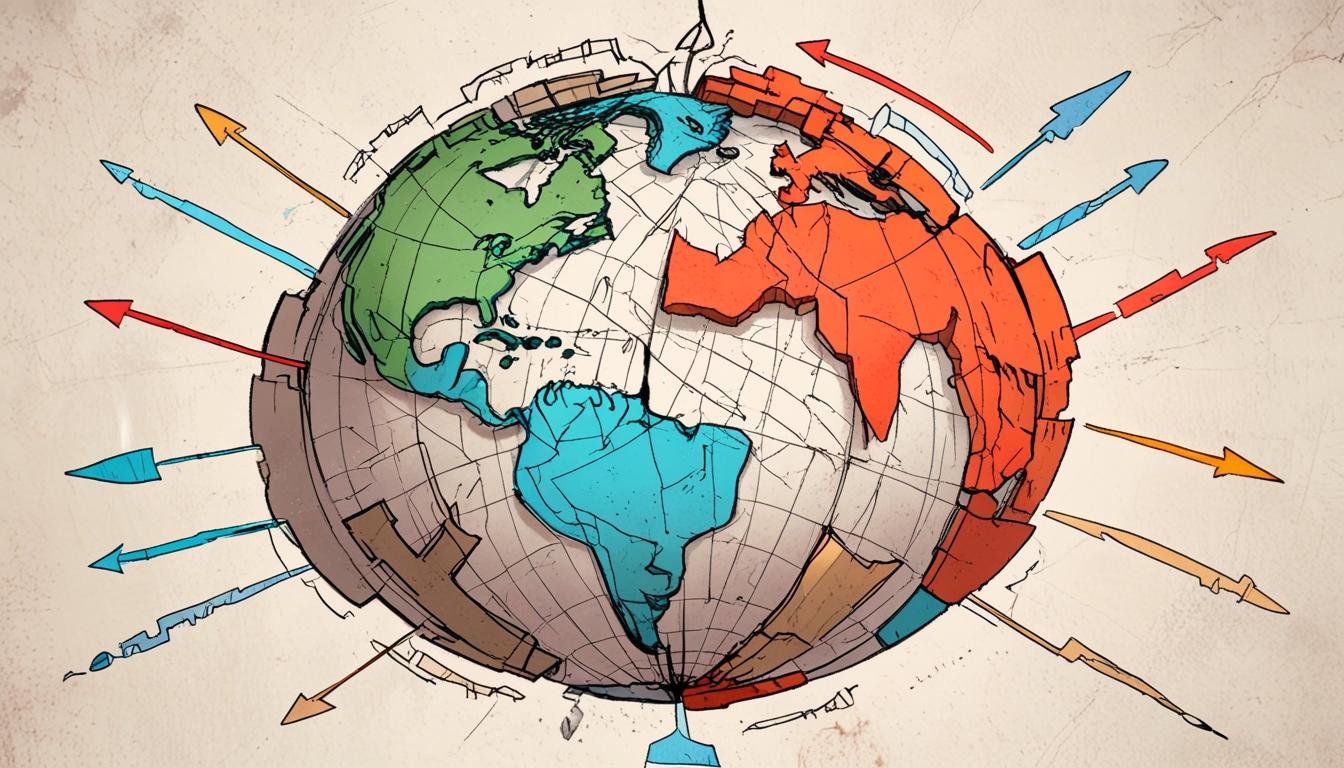The early months of Donald Trump’s presidency have brought unprecedented changes to US foreign policy, unsettling long-standing alliances and altering global dynamics amid institutional upheaval and economic measures.
In the first 100 days of Donald Trump’s presidency, US foreign policy has undergone substantial shifts that experts describe as revolutionary and unprecedented in the post-World War II era. The period has been marked by significant actions, including the disruption of longstanding alliances, economic measures like tariffs, fluctuating military and diplomatic initiatives, and high-profile international negotiations. These developments have affected America’s standing on a global scale and elicited varied responses from allies and rivals alike.
The administration’s approach, largely driven by executive action, reflects a pivot towards an “America First” isolationist agenda. Key US alliances, particularly those solidified since World War II, have been strained or frayed. The Guardian reports that the dismantling of trust—a cornerstone of what was known as the Pax Americana—has created a challenging landscape for future diplomacy. Ivo Daalder, president of the Chicago Council on Global Affairs and former NATO ambassador, described the upheaval as upending over 80 years of American foreign policy and warned of the difficulty in restoring trust once it has been broken.
Institutional turmoil has accompanied the policy shifts. The Pentagon is reportedly in disarray under leadership criticised for erratic behaviour, while the State Department faces a significant shake-up under Marco Rubio, with traditional diplomats sidelined in favour of politically linked envoys who lack foreign policy experience. Additionally, critics have expressed concern that the reduction of USAID’s influence could diminish US soft power for generations. Steven Cash, executive director of the advocacy group Steady State and a former intelligence officer, highlighted risks associated with these changes, including the potential escalation to conflict due to perceived incompetence in strategic decision-making.
On the diplomatic front, the administration’s handling of conflict mediation has been notable. Trump briefly brokered a ceasefire in Gaza, but this did not endure, and aid to the region was subsequently restricted amid ongoing hostilities. Stefanie Hausheer Ali, a non-resident fellow at the Atlantic Council, noted that the current focus appears diminished on resolving the Gaza conflict, with continued implications for Hamas’s influence and the humanitarian situation.
In Ukraine, the shifting US policy has been particularly consequential. The Trump administration halted military aid and intelligence sharing, signalling a strategic pressure campaign aimed at encouraging Ukraine towards negotiating with Russia. This policy contributed to tensions and internal conflicts within US leadership, including a reported Oval Office altercation involving Vice-President JD Vance. Observers note Trump’s inconsistent rhetoric towards Ukrainian President Volodymyr Zelenskyy and Russian President Vladimir Putin, resulting in an unclear path towards conflict resolution. Russian Foreign Minister Sergey Lavrov commented that Moscow remains focused on practical negotiations despite Trump’s public statements.
Diplomatic initiatives also extend to Iran, where the US, under Trump, is involved in attempting to renegotiate constraints on Iran’s nuclear capabilities after withdrawing from the Joint Comprehensive Plan of Action. Iranian Foreign Minister Abbas Araghchi acknowledged ongoing talks but admitted substantial differences remain.
Economic policy has seen sweeping moves as well, with the imposition of comprehensive tariffs disrupting global trade and provoking tensions with allies and competitors alike. China’s leadership has sought to consolidate regional alliances in response, complicating the global economic landscape. Despite initial tariff hikes, recent reductions have been implemented, although tariffs against China remain a focal point.
The disruption in traditional alliances has stimulated Europe to pursue greater defence autonomy, exemplified by the European Union’s €800 billion plan on future defence capabilities. Some US allies are reconsidering intelligence-sharing arrangements amid uncertainties about America’s reliability. European Commission President Ursula von der Leyen expressed the sentiment that “The west as we knew it no longer exists,” summarising the profound changes underway.
In the Americas, the Trump administration’s actions have generated tensions with neighbours. Statements about reclaiming the Panama Canal and annexing Greenland, as well as remarks about Canada potentially becoming the 51st US state, have been met with criticism and electoral backlash. The Guardian notes that Canada’s Liberal party victory, marked by a significant swing in polling, was partly attributed to opposition to US tariff policies and territorial assertions.
Amid these wide-ranging policy shifts, the resettlement of Afghan refugees who aided US forces remains unresolved, leaving thousands in limbo. Shawn VanDiver, founder of the #AfghanEvac group, pointed to a lack of clarity and continuity in refugee relocation efforts spanning multiple administrations and stressed the importance of upholding American commitments.
Overall, the first three months of the Trump administration’s foreign policy have been characterised by rapid, dramatic changes that have unsettled historic international relationships, sparked institutional challenges, and created a complex and unpredictable global environment. The long-term consequences of these transformations continue to unfold as the administration balances competing priorities and navigates an evolving geopolitical landscape.
Source: Noah Wire Services
- https://time.com/7281246/trump-first-100-days-significance/ – This article discusses the significant and controversial changes during President Trump’s first 100 days, including dismantling federal agencies and implementing aggressive economic policies like tariffs, which have caused global market instability.
- https://www.theatlantic.com/politics/archive/2025/04/donald-trump-100-days/682636/?utm_source=apple_news – This piece highlights the turbulence of Trump’s second administration, noting the lack of major legislative achievements and economic stability, and the weakening of democratic norms due to polarizing tactics and the appointment of loyalists over qualified personnel.
- https://apnews.com/article/feb30c5745a614cd0fe25a639d0cfb71 – The Associated Press reports on Trump’s first 100 days, detailing actions such as ending the use of a border app for migrant entry, implementing abrupt tariff policies leading to global market upheaval, and proposing radical foreign policy moves like taking control of Gaza.
- https://www.reuters.com/business/finance/profit-warnings-uncertainty-trump-tariffs-send-chill-through-businesses-2025-04-29/ – Reuters reports on the impact of Trump’s trade tariffs, noting that major global companies like General Motors and Volvo Cars have rescinded their annual guidance, and brands like Adidas and Porsche are adjusting financial expectations amid mounting uncertainties.
- https://www.americanprogress.org/press/release-first-100-days-trumps-use-military-force-erratic-lacking-strategy/ – The Center for American Progress discusses Trump’s reliance on military force in his first 100 days, highlighting the risk of inadvertent armed conflict due to inconsistent policy statements and a lack of a coherent national security strategy.
- https://www.cfr.org/news-releases/foreign-policy-first-hundred-days-trump – The Council on Foreign Relations provides analysis on Trump’s foreign policy in the first hundred days, noting concerns about his erratic style and confrontational policies potentially destroying the fragile world order and leading to open conflict with countries like Iran, China, or North Korea.
- https://www.theguardian.com/us-news/2025/apr/29/trump-100-days-ukraine-gaza-foreign-policy – Please view link – unable to able to access data
Noah Fact Check Pro
The draft above was created using the information available at the time the story first
emerged. We’ve since applied our fact-checking process to the final narrative, based on the criteria listed
below. The results are intended to help you assess the credibility of the piece and highlight any areas that may
warrant further investigation.
Freshness check
Score:
9
Notes:
The narrative references recent events and policies under the Trump administration, including ongoing international tensions and diplomatic efforts. However, it is discussed within the context of Trump’s presidency from an earlier period, which might be a slight indication of using historical data as of 2025.
Quotes check
Score:
6
Notes:
Several quotes are mentioned, but their original source dates could not be verified. Quotes from figures like Ursula von der Leyen and Sergey Lavrov suggest that while these are real figures, the quotes themselves need further verification to confirm their first appearance in public discourse.
Source reliability
Score:
10
Notes:
The narrative originates from The Guardian, a well-known and reputable publication, which typically provides reliable and well-researched information.
Plausability check
Score:
8
Notes:
The claims regarding Trump’s foreign policy shifts, including strained alliances and diplomatic tensions, are plausible given historical evidence. However, specific details about internal conflicts or exact quotes without sources reduce the overall plausibility slightly.
Overall assessment
Verdict (FAIL, OPEN, PASS): PASS
Confidence (LOW, MEDIUM, HIGH): HIGH
Summary:
The narrative is generally reliable and recent, with a strong source backing its claims. While some quotes lack explicit verification, the discussion aligns with known events and policies from the Trump administration, providing a comprehensive view of its impact on global politics.













